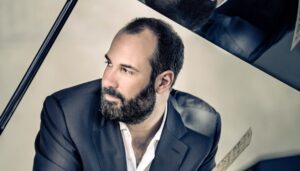
Q & A: Raphael Fusco & His New Cantata ‘Un’alma inamorata’
By John VandevertNo stranger to the rapidly changing world of classical music, composer and musicologist Raphael Fusco has found a novel way to blend his skills as a music researcher and a composer. Previously he was interviewed about his first chamber opera, “inSOMNIA,” a fairytale opera which blended his ear for different musical genres. This time, in his new cantata for countertenor (mezzo-soprano), strings, and basso continuo entitled, “Un’alma inamorata” (A Soul In Love), Fusco takes his archival knowledge and mixes it with his own creative language.
Using a libretto written by 18th-century librettist Abbé Francesco Mazziotti for 22-year old G. F. Handel and his eponymous 15-minute cantata (1707), Fusco again uses his eclectic sense of musical aesthetics to create a contemporary manifestation of the story of how one’s heart rejoices at the difficulties of love as one has successfully been able to love more than oneself but another. Who is doing the speaking is unknown but at the center of the cantata is the celebration of love’s challenges, for through the challenges one learns more about themselves than previously known. Once again, I got the chance to sit down with Fusco to talk through his new cantata and understand his musical thinking, the process of its creation, and his musicological work.
OperaWire: Where did the roots of the work come from?
Raphael Fusco: The cantata came about in October 2021 when I was preparing for the world premiere of my murder-mystery chamber opera “Der Telefonist” in Oldenburg, Germany with Italian-American countertenor Nicholas Tamagna, for whom I wrote the title role. Nicholas asked if I would write a new piece for him to premiere with the Berlin-based Baroque ensemble I Porporini lead by harpsichordist and conductor Gerd Amelung.
The piece was to fit in a program of solo cantatas and instrumental works inspired by love and craziness in Arcadia. The timeless sound of historical instruments has always enchanted me, and to work with Nicholas is always a joy so I immediately accepted. We decided it would be interesting to revisit a cantata text which Handel had already set. After scouring dozens of works I came across “Un’alma innamorata” on an 18th century text attributed to Abbé Francesco Mazziotti. It tells the story of a soul in love who struggles with their fidelity. In the end the moral of the story: Who wishes to revel in love’s delights must first learn how to love. The premiere took place at the gorgeous Schlosstheater in Celle, Germany in June 2022. We recorded “Un’alma innamorata” in Berlin in January 2023 and now I am excited to finally release the video and share this heart-warming piece with the world!
OW: What inspired you to use a countertenor?
RF: The countertenor voice, with its almost other-worldly androgynous quality, has always intrigued me. It’s a captivating blend of both male and female characteristics. What adds to the fascination is the audience’s reaction – I often witness non-musician friends amazed when they realize that these soaring high notes are sung by a man. What particularly appealed to me was the non-gender specificity of the text itself. The protagonist and the object of their love aren’t confined to being male or female. I envisioned the protagonist sung by an angel or putto, maybe even Cupid, narrating the story. The countertenor voice perfectly captures the ethereal quality I was looking for.
OW: How did you come to find the work’s text?
RF: Nicholas suggested the intriguing idea of using an 18th-century text that would align with the program’s theme of “Craziness and Love in Arcadia.” At that time, I had just completed a substantial cantata for soloists and choir titled “La Contesa Canora,” based on a text by Ottavio Rinuccini depicting the singing competition between the Pierides and the Muses from Ovid’s Metamorphoses. I thoroughly enjoyed breathing new life into old words, and the added bonus was not having to worry about obtaining rights to use the text. So I scoured the internet and delved into around thirty solo cantata texts that Handel had set. The moment I encountered the opening recitative text of “Un’alma,” I was immediately captivated and knew it was the perfect fit for the work.
OW: How does the work reflect your current creative vision?
RF: It embodies my core values as a composer, bringing together elements that hold significant importance for me. It showcases the marriage of words and music, going beyond mere text painting and prosody. The music translates the text into a language that brings the rhythms, shapes, and imagery to life in sound, creating catchy and memorable arias. The work bridges the Baroque and the modern, establishing a unique, timeless sonic realm. To straddle traditions and ideals of the past while viewing them through a contemporary lens is a crucial aspect of my creative vision. Since settling in Europe in 2018, I’ve relished observing how antiquity can thrive in a modern setting, exploring the synthesis of the past’s accomplishments with a fresh and original perspective. The cantata reflects my love for the interplay of text and music, the coexistence of timelessness with a modern context, and the courage to be both bold and tender, vulnerable yet powerful. The composition stands on the shoulders of giants, continuing a rich tradition while innovating by reevaluating ideals of the past through a contemporary and post-modern lens.


